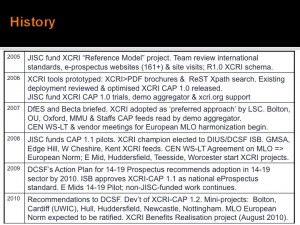A call has gone out today for institutions to bid for funding to further enhance the sectors’ knowledge and application of open processes by implementing a standard format for describing course data, which is at the heart of many learning providers organisational processes. This represents a massive wide scale investment; the initial work (Stage 1) will be identifying institutional readiness for opening up Course Data processes, and a number of projects will then be selected for funding to to go on to implementation of the proposed work (Stage 2)
The work is to be funded by the JISC, and builds on the sterling work to date by the eXchanging Course Related Information (also known as XCRI) initiative, the new UK eProspectus standard. In short it is a way of describing learning content and information and saving the rekeying of this information into numerous systems.
As the call documentation notes
“JISC have made it easier for prospective students to decide which course to study by creating an internationally recognised data standard for course information, known as XCRI-CAP which is conformant with the new European standard for Advertising Learning Opportunities. This will make transferring and advertising information about courses between institutions and organisations more efficient and effective”
Background
I can recall attending some of the CETIS Enterprise SIG meetings and members of that suggesting an offshoot meeting looking at the practicalities of sharing course information – ideally with other institutions and agencies such as UCAS, but even internally this was no mean feat. I went along to the start up meeting of this group of brave bods in 2005 and remember thinking “this sounds massive, but they think it is do-able.” Led by champions such as Mark Stubbs and Alan Paull, and backed by the efforts of CETIS, mainly through Scott Wilson, the work kicked off after receiving funding from JISC to trial the idea. They ‘mapped the terrain’ which the work should cover and produced the Lord of the Rings inspired map below

All images are taken from slides held in the excellent resources on the XCRI support site
Large leaps have been taken since the early days, with many institutional roll outs and success stories. As Scott Wilson writes in his blog, “An extended period of beta testing and specification development is now drawing to an end: what comes next is adoption, use, and adaptation. Part of this is HEFCE’s investment of around £4m in course management across the sector which should see large numbers of courses being advertised in XCRI-CAP format.”
But it will only be proven truly successful when it achieves a wider roll out, which the JISC have acknowledged and agreed to back in this new call. In light of this, my CETIS colleague David Sherlock and I took a look at XCRI and offer the following introduction to the area.
What is XCRI?
At a glance
XCRI is a standard for course advertising data. The term stands for eXchanging Course Related Information. It is a specification designed for Universities and Colleges that allows the various generic aspects of a course description (i.e those that are used in the curriculum documentation and for marketing purposes) to be made publicly available so they can be transferred easily between information systems. The starting point for use has been a subset of this information, the XCRI-CAP (Course Advertising Profile) which is a simple list of fields.
Open Process
XCRI is an open process; with community-driven input that is supported by the Joint Information Systems Committee of the UK Higher and Further Education funding councils to ensure its future development.
Why use XCRI?
If a college, university or training provider has courses and wants to let people know about them then XCRI can help. Once course data is available in XCRI format then aggregation systems can easily collate the information, which can then be used to share course related information between systems in organisations with other sources. Potential students can then use this information to select courses.
XCRI in use
Many people, who hear the term often perceive it to be a vastly complex, costly, time consuming effort to implement. However, those that have undertaken some XCRI work have been surprised how quick and easy it was and how it has opened up much of their information, reducing duplication and bottlenecks in workflows and processes.
There is an XCRI community with across various sectors to tap into, case studies of implementation and a user and developer resources to access and receive advice on how to implement the specification. There is a documented history of development as the table below illustrates (click on image to enlarge):

History of XCRI progress
Benefits
There are many benefits unlocked by making course information available in XCRI format including:
Visibility
The XCRI format is being adopted by an increasing number of course aggregators, pushing out information via RSS etc into aggregators (which pull information together from various sources). If course data is not in the correct format then the information may not be collected by aggregation systems and the organisation could be missing out on potential learners. Some aggregators of XCRI feeds include:
• UCAS
• The 14-19 Prospectus
• National Learning Directory
Increase Efficiency
There are potential internal benefits and business process improvements to be made throughout an organisation by using a single standardised format for course advertising data. XCRI will help with improved quality assurance and consistent information, XCRI can interface with internal approaches for course approval and validation and there will be less data input and margin for error for both the Learning Provider and aggregating systems.
Let learners make better comparisons
By using this standard approach, learning providers are making sure that their course profile is consistent with other learning providers. This information can be then be included in a wider range of course information sources that aggregate it and learners will be able to use these to make informed decisions about which courses suits their needs.
The Future
There is current ongoing work entitled Metadata for Learning Opportunities (MLO) with an aim to unify XCRI and European equivalent approaches. The MLO will be very similar and almost retrospectively fit with the XCRI approach. This means that there should be little duplication of effort and any work implementing XCRI now and the oranisation will be at the Learning Provider will be at the forefront of current developments.
It is important to emphasise the open nature of development, the XCRI community want to build from the basic XCRI CAP profile to include more information to allow sharing of more course related information. Contributions to this work (even from outwith the funded projects) are also welcome, as a broad range of input is beneficial. The new JISC call addresses key areas of work identified by the community and potential users; the deadline for receipt of Letters of Commitment in response to this call is 12:00 noon UK time on Wednesday 7 September 2011. There will be a briefing event for further information on Tuesday 19th July, see the JISC Page for further information.
Definitions & Further Information
Specification:
An explicit set of requirements to be satisfied by a material, product, or service. http://en.wiktionary.org/wiki/specification
A standard is an agreed, repeatable way of doing something
http://www.bsigroup.com/en/Standards-and-Publications/About-standards/What-is-a-standard/
Interoperability is the capability of a product or system to interact and function with others without any access or implementation restrictions http://en.wiktionary.org/wiki/interoperability
Further Information
XCRI:
http://www.xcri.org/
Knowledge Base:
http://www.xcri.co.uk
Briefing papers and slides from over the years:
http://www.xcri.co.uk/briefing-papers-on-xcri.html

In UWIC (Cardiff) we have been collaborating on XCRI with UK universities for over a year, raising the profile of the standard for exchanging course information between institutions and aggregators. For us it has always seemed a ‘no brainer’ bringing consistent,universally valuable, extensible course data – enter once and disseminate to many – across a diverse constituency. A 21st century opportunity to use technology positively to solve an intractable problem.
But for Wales, apparently, this is to be a step too far. The next two JISC funding rounds are limited, exclusively, to English institutions through HEFCE. There is seemingly no appetite for HEFCW to support the very project which might assist in Leighton Andrews drive for joined up, collaboative growth in tertiary education in Wales.
And backed by me as head of Enterprise SIG at the time; I booked the original start up meeting to gather together the people talking about standardised course information, and supported the XCRI group and meetings in its early stages!
I hope the wider roll out is successful.